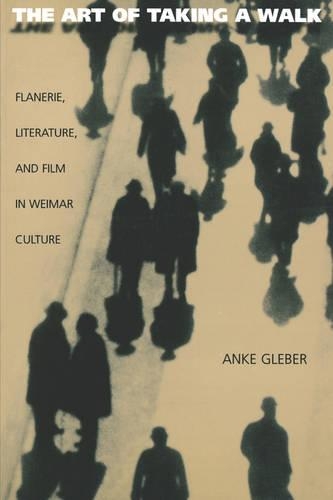
The Art of Taking a Walk: Flanerie, Literature, and Film in Weimar Culture
(Paperback)
Publishing Details
The Art of Taking a Walk: Flanerie, Literature, and Film in Weimar Culture
By (Author) Anke Gleber
Princeton University Press
Princeton University Press
2nd March 1999
United States
Classifications
Professional and Scholarly
Non Fiction
Films, cinema
Urban communities / city life
Literary studies: c 1900 to c 2000
791.43094309041
Physical Properties
Paperback
304
Width 197mm, Height 254mm
425g
Description
Anke Gleber examines one of the most intriguing and characteristic figures of European urban modernity: the observing city stroller, or flaneur. In an age transformed by industrialism, the flaneur drifted through city streets, inspired and repelled by the surrounding scenes of splendor and squalor. Gleber examines this often elusive figure in the particular contexts of Weimar Germany and the intellectual sphere of Walter Benjamin, with whom the concept of flanerie is often associated. She sketches the European influences that produced the German flaneur and establishes the figure as a pervasive presence in Weimar culture, as well as a profound influence on modern perceptions of public space. The book begins by exploring the theory of literary flanerie and the technological changes--street lighting, public transportation, and the emergence of film--that gave a new status to the activities of seeing and walking in the modern city. Gleber then assesses the place of flanerie in works by Benjamin, Siegfried Kracauer, and other representatives of Weimar literature, arts, and theory.She draws particular attention to the works of Franz Hessel, a Berlin flaneur who argued that flanerie is a "reading" of the city that perceives passersby, streets, and fleeting impressions as the transitory signs of modernity. Gleber also examines connections between flanerie and Weimar film, and discusses female flanerie as a means of asserting female subjectivity in the public realm. The book is a deeply original and searching reassessment of the complex intersections among modernity, vision, and public space.
Author Bio
Anke Gleber is Research Associate in Film Studies at the University of California, Irvine. She has written widely on European modernism, the Weimar Republic, and German film.
